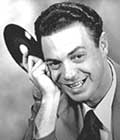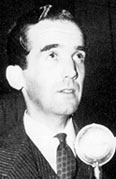|

|

|
FDR (RealAudio 28.8)
The radio was the family's lifeline during the
administration of President Franklin D. Roosevelt. He was the first
president to use mass media with his "fireside chats." FDR understood, as
very few did, the intimacy of the new medium.
|

|
|

|

|
Alan
Freed (RealAudio 28.8)
Alan Freed was the messenger for Rock 'n Roll, the
music that drove the wedge between the generations that led to the
"generation gap" of the '60s. He was toppled in the payola scandal.
|

|
|

|

|
The Hindenburg (RealAudio 28.8)
Was the forerunner of the television talk shows of
today, the Hindenburg disaster of 1937? It will never go down in history
as journalism's finest moment, but media historians say the moment was the
downbeat of something would become prominent: live news broadcasts.
|

|
|

|

|
Edward R. Murrow (RealAudio 28.8)
Like Socrates who taught Plato, who taught Aristotle.
Murrow taught Cronkite, who taught Rather, Jennings and Brokaw. He made
his mark with live reports from London during World War II. Vietnam was
the "living room war," but Murrow was the first to bring the war into
people's homes through the radio.
|

|
|

|

|
War of the Worlds (RealAudio 28.8)
Most people knew the 1938 broadcast of the invasion was a fake, but most people didn't know they were witness to an historic moment. The decision to retell the H.G. Wells' story by feeding on the fear created by a real world war that was about to break out is one of the most sophisticated uses of the medium.
|

|






